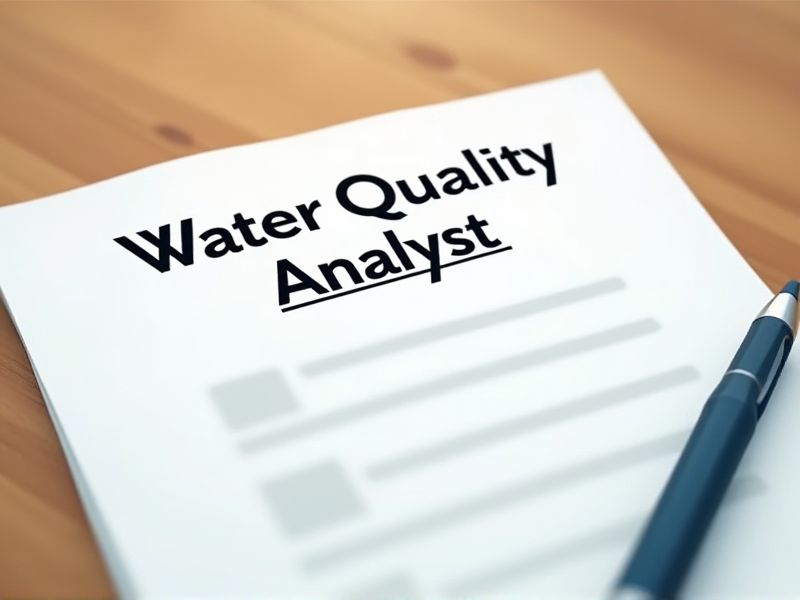
Water quality analysts play a crucial role in ensuring the safety and health of water resources, which directly impacts public health and ecosystems. Certifications in this field verify an analyst's proficiency in understanding water chemistry, biology, and regulatory compliance. The specialized skills and knowledge acquired through these programs are critical for accurate water testing, data interpretation, and environmental protection. Here are some key certifications for aspiring Water Quality Analysts.
Certified Water Quality Analyst (CWQA)
A Certified Water Quality Analyst (CWQA) is crucial for maintaining public health, as they ensure water safety by accurately identifying contaminants and pollutants. Rigorous training and certification enhance their ability to apply advanced analytical techniques to assess water quality effectively. Regulations and safety standards often require expert oversight, which CWQAs provide, ensuring compliance with legal and environmental guidelines. The presence of a certified analyst increases public confidence in water quality management practices, reducing risks associated with unsafe water consumption.
Certified Water Systems Operator (CWSO)
Certified Water Systems Operators ensure water safety by maintaining compliance with health regulations. Their expertise in system operations helps identify and mitigate contamination risks. Proficiency in monitoring and testing equipment leads to accurate water quality assessments. Their role supports public health by ensuring access to clean and safe drinking water.
Certified Laboratory Analyst (CLA)
A Certified Laboratory Analyst is needed for water quality analysis because they possess verified skills and knowledge required to accurately assess water samples. Proper analysis by a CLA ensures compliance with health and safety regulations, minimizing risks of contaminants. Their expertise helps in implementing corrective measures efficiently when water quality deviates from standards. Their role supports reliable data generation, crucial for informed decision-making in water management and policy development.
AWWA Water Quality Certification
The AWWA Water Quality Certification is essential for ensuring that water analysts possess the expertise to maintain safe and clean water supplies, critical as deteriorating water quality poses health risks. Certified analysts are equipped with standardized procedures to accurately test and assess water, leading to improved public health outcomes. This certification validates an analyst's competency in utilizing advanced technologies and methodologies required for contemporary water quality challenges. Regulatory compliance with water quality standards becomes more attainable, reducing incidences of violations and safeguarding consumer trust.
Water Quality Association (WQA) Certification
Securing the Water Quality Association (WQA) Certification for a Water Quality Analyst demonstrates adherence to recognized standards, ensuring consistency and reliability in water testing practices. This certification provides the analyst with credibility, signaling to clients and employers an assurance of expertise and professionalism. The certification process also enhances the analyst's skillset through up-to-date training on the latest technologies and methodologies in the water quality field. WQA Certification can impact career prospects, providing competitive advantages when pursuing career advancements or new opportunities.
Certified Environmental Professional (CEP)
A Certified Environmental Professional (CEP) possesses specialized knowledge that enhances the accuracy of water quality analyses. Rigorous standards maintained by CEPs ensure compliance with environmental regulations, reducing legal risks for organizations. Their expertise in identifying pollutants leads to effective strategies for water contamination prevention and remediation. By implementing best practices, CEPs contribute to maintaining sustainable water resources vital for ecosystems and public health.
ISO/IEC 17025 Laboratory Accreditation Training
ISO/IEC 17025 Laboratory Accreditation Training ensures water quality analysts are competent in producing precise and reliable test results. This accreditation enhances the credibility of laboratories by aligning their procedures with international standards. When labs adhere to these standards, they increase confidence among stakeholders, including regulatory bodies and customers, which can lead to continued and expanded business opportunities. The training also helps identify systematic errors and implement corrective actions, improving the overall efficiency and accuracy of water quality testing processes.
Hazardous Waste Operations and Emergency Response (HAZWOPER)
HAZWOPER training equips water quality analysts with essential skills to safely handle potentially hazardous substances found during water testing. Exposure to contaminants often poses health risks, making HAZWOPER education crucial for minimizing workplace incidents. Regulatory frameworks require these analysts to understand emergency response protocols, ensuring compliance with safety standards. Enhanced knowledge through HAZWOPER leads to more effective contamination control, ultimately protecting both public health and the environment.
OSHA 30-Hour General Industry Certification
The OSHA 30-Hour General Industry Certification equips a Water Quality Analyst with essential safety training to identify and mitigate potential workplace hazards, thereby reducing accident risks. This certification imparts knowledge about hazardous material handling, which is crucial when dealing with chemicals that impact water quality. Enhanced understanding of safety regulations through this certification ensures that analysts comply with industry standards, improving workplace safety culture. Employers value certified analysts, linking this credential to increased job opportunities and career advancement within the environmental sector.
Good Laboratory Practice (GLP) Certification
Achieving Good Laboratory Practice (GLP) Certification ensures that water quality analysts follow standardized procedures, leading to reliable and reproducible test results. This certification builds trust among stakeholders by demonstrating adherence to regulatory requirements and quality standards. Certification also enhances credibility and competitiveness of the laboratory conducting water quality analysis. Inconsistent and inaccurate results decrease with GLP, promoting public health through consistent water safety assessments.
Summary
By obtaining certifications, you as a Water Quality Analyst can enhance your credibility and professional stature within the industry. Certifications demonstrate your commitment to maintaining high standards, which can increase trust with clients and stakeholders. As a result, it's likely you will experience more career advancement opportunities and possibly higher compensation. Enhanced skills and knowledge from certification courses can also lead you to improve the quality and efficiency of your water analysis work.
